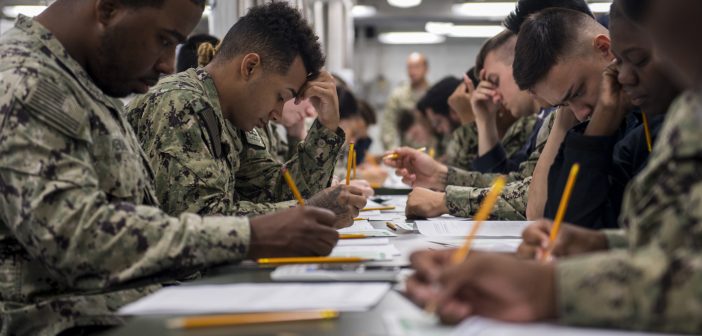The Navy’s experiment with online exams is gaining steam.
Aided in part by a mobile application the Navy is now qualifying sailors for advancement through a new military knowledge exam that can be taken on smart devices such as tablets and smartphones — without needing a Navy computer.
It’s a concept the service would love to expand on in the future.
Such online, on-demand exams could be served up when a sailor was ready and eligible.
The cascading effects could eventually signal the end of the semi-annual exam cycles the Navy uses to determine who moves up in the petty officer ranks. Advancement could then shift to a filling vacancies on a year-round basis.
But we’re getting ahead of ourselves. More on that later.
Happening Now
Flash back to April 2018, when the Navy announced the elimination the 25 Professional Military Knowledge questions included on individual rating exams.
Instead, they built an online system that dishes up on demand exams on those military topics all sailors must know at he next highest paygrade.
The idea of two separate tests came from fleet senior enlisted. Their contention was that sailors needed dedicated study on rating exam occupational topics. Having to also study military topics was an unneeded distraction.
In addition, with only 25 questions, the Navy’s advancement guru’s didn’t think it provided a complete picture of a sailor’s military knowledge.
The solution settled on was to build a new 100-question exam strictly on military topics that include career information, leadership and character, naval heritage, professional conduct and seamanship.
To be eligible for advancement to paygrades E-4 through E7 sailors now must cut 80% score in each topic area.
Unlike the current advancement exams, sailors only have to pass the quiz once at each paygrade level. Once they advance, however, they must take another military knowledge test to be eligible for advancement again.
Another new twist is that officials aren’t requiring sailors to be time-in-grade eligible to take the PMK test.
This means sailors can take the test at anytime and be ready to go once they reach their required time in grade to advance.
Growing Pains
The online exam went live this past December. At the time it could only be taken on a computer with common access card security and a connection to the internet. But it is available around the clock when the sailor felt ready and able to test.
There’s only one catch. Two of the things sailors lack most, especially at sea, is access to a Navy computer and consistent access to the internet. CAC card access to Navy servers is possible at home, but it requires extra hardware and setup.
By the end of June, six months into testing, only about 34 percent of both active and reserve sailors in the required pay grades had taken and passed the test.
This was a problem.
Looming just two months away was the Sept. 1 deadline for active-duty sailorsto pass the test to be eligible compete to sit for this months semi-annual petty officer rating exams.
That requirement will kick in for reserve petty officer candidates with on the Spring 2020 exam cycles. For those active and reserve E-6’s wanting to compete for chief, it becomes a requirement in 2020 as well.
An App for That
The Navy was already working on a solution — and yes — there’s an app for that.
In recent years, the the Navy has been pushing more and more online access to pay, personnel and other routine functions through the use of personal computers as well as mobile applications on smartphones and tablets.
But until recently security has been a show stopper. In an era of increasing cyber warfare, the military was reluctant to open up more access to their computer networks.
But the Navy is leading the way in such reforms of personnel systems, helped by a complete and still ongoing overhaul of its outdated servers and software.
Now using systems similar to what banks and other online institutions have to protect data and personel information, the Navy has forged ahead in measured steps to bring that access to sailors for managing their careers online.
In May, the service released a mobile app version of the test.
Once downloaded, the app doesn’t require the internet to work. Sailors can also take the test in parts, completing topics separately.
“Afloat Sailors don’t always have access to the Internet, so this app was specifically designed to allow them to take the PMK-EE while deployed or without an Internet connection,” said Tom Updike, a retired master chief who today is the deputy director of the Navy Advancement Center in Pensacola, Fla.
When their device regains internet access, he said, they can log into a Navy server using their Common Access Card number and sync their progress or completion with the Navy in their Electronic Training Jacket.
As of Sept. 16, the app has already has seen more than 74,000 downloads.
That makes it the second most popular app in the “Navy App Locker” where the Navy has made available dozens of applications providing sailors with a growing number of career management tools. The apps are also free downloads free the Apple App and Google Play online stores as well.
In the four months since the app’s release, it’s helped boost the numbers of sailors completing the exam by over 30,000. Since June, nearly 70,000 an additional sailors have logged their exam completion through all methods, bringing total completions to 155,438, roughly 60 percent of all active and reserve sailors each paygrade.
“This has been a huge success,” Updike said “The PMK-EE app is simply the easiest way for most sailors to access the test.”
Future Plans
What the Navy learns from this online exam could impact the future of how and when the Navy identifies sailors for advancement into or up in the petty officer ranks.
Already, the Navy has increased it’s Meritorious Advancement Program and this year will see the service inch towards these command designated rank hikes making up as much as 25 percent of all enlisted advancements up to the E-6 level.
Also in the works is a new performance evaluation system, still a year or two away from being implemented in the fleet that will provide a clearer picture of individual performance on the job, too.
But one thing is perfectly clear — advancement exams are here to stay.
Six years ago, the Navy set out to kill the tests in an effort to move to a totally performance-based advancement model like the current meritorious system is.
That effort was kicked off by now retired Adm. Bill Moran when he was the chief of naval personnel, his point man for the job was the current Vice Chief of Naval Operations, Adm. Bob Burke.
But a funny thing happened on the way to the trash heap.
The Navy’s experts again came to the decision that today tests are still the best current way to gauge a sailor’s in rating knowledge with Burke calling them “absolutely impartial and objective” though they’re not without their own issues, too.
That realization has now led to efforts to improve the exam system.
“Ultimately we’d like to go to an exam that is all electronic, that can be taken on demand, is personalized to the individual and the NEC’s they have, so they’re getting examined on what their skills should be,” Burke said last fall. “That’s where we’re heading.”
That’s where the new PMK app and online exam comes into the picture. Burke says it’s also a pilot program to find and work out the problems and pitfalls of testing electronically and eventually online. Security of the texts and their questions are of paramount, but not insurmountable concern, he said.
Over the next few years, Burke details that sailors will start to see the existing paper exams go from being quite generic to the rating as a whole to testing a sailor based on the specific Navy Enlisted Classifications they’ve been trained in.
“The [paper]exams will start to get a little more tailored to the career fields we’ve defined,” he said. “Then four our five years from now, we will get to the point of individually tailored exams.”
Those exams would be available online and on demand, freeing the Navy from having Navy-wide proctored exams on a twice-yearly schedule. Instead, sailors could test whenever they become eligible to advance.
The exam would be on the individual sailor’s schedule, not the Navy’s, Burke said based on “when they become eligible.”
Advancements, Burke said, could then become a year-round filling of vacancies in the ranks as they appear, “smoothing out the advancement system.”
This would be made possible by a constant “rack and stack” of sailors in ratings and even sub-specialties that is based on their exam scores, evaluations and other factors such as education and awards points as happens today.
If a sailor wants to improve their standing, they’d be able to study and take another exam online, again when they feel ready. In addition, such tailored exams could be also dished up online for a sailor using a smart device app, too.
“Right now we’re tied to dates because of the paper exams – it’s one exam it’s paper and we don’t want to compromise it,” he said. “If we have online exams tailored to the individual we won’t have to do that anymore.”
Burke estimated that it would take at least half a decade to fully realize this “evolutionary” vision of the what the Navy’s advancement system could be.
“The technology is really brining us closer, but in reality I think five years away from the completely tailored electronic exam,” Burke said.
“But when we get there, it will be a better measure of the sailor’s knowledge in the job they are filling and the bottom line is they will have to study less of the extraneous stuff that’s not tied to their jobs.”



